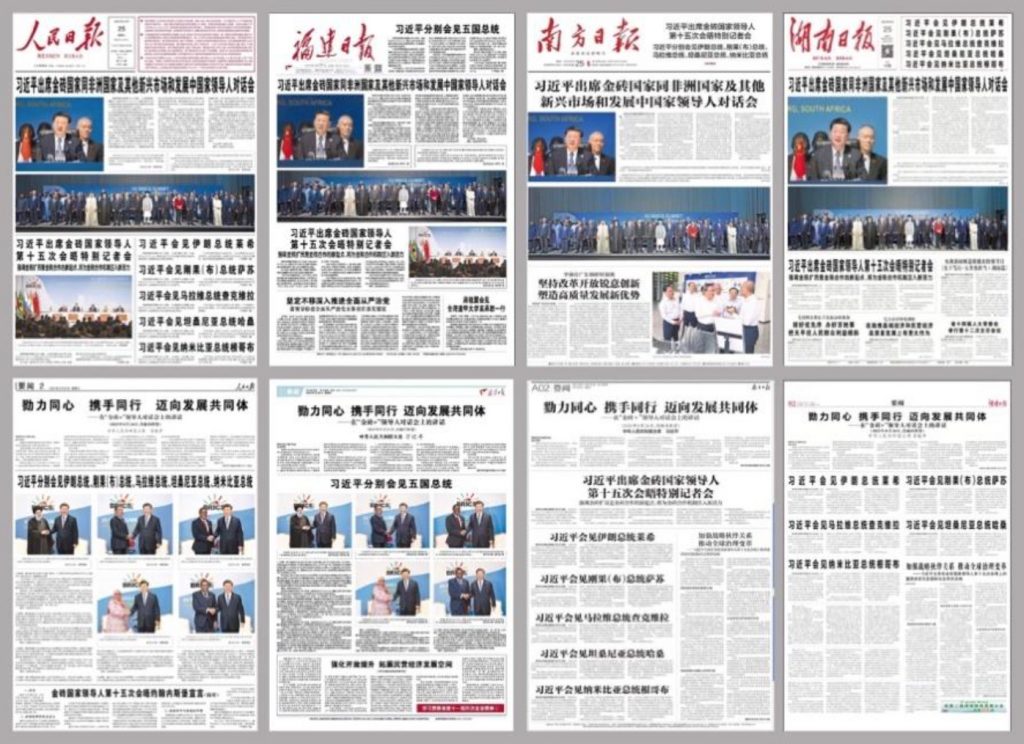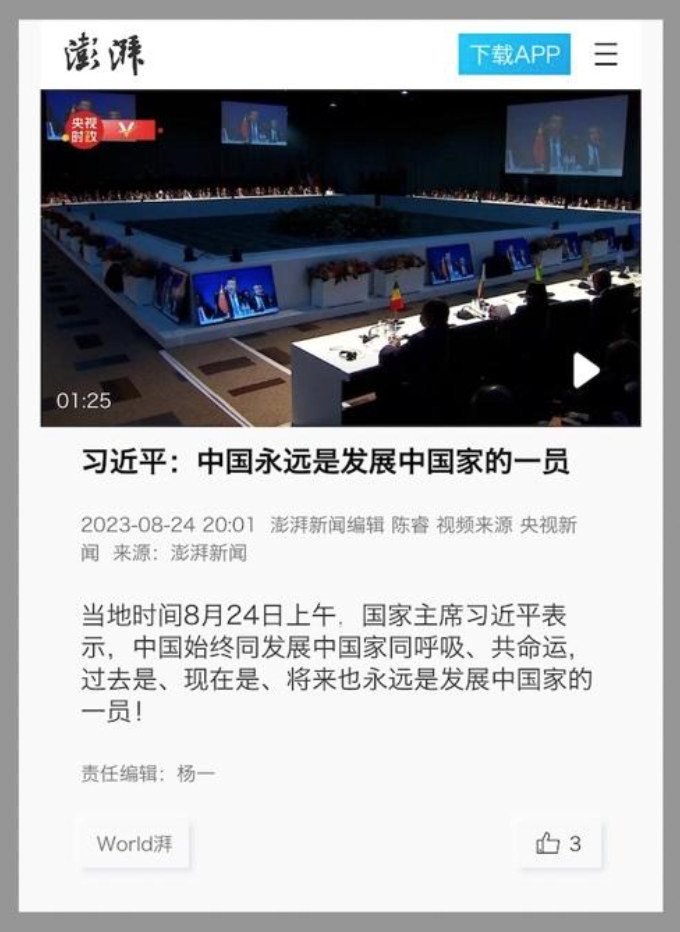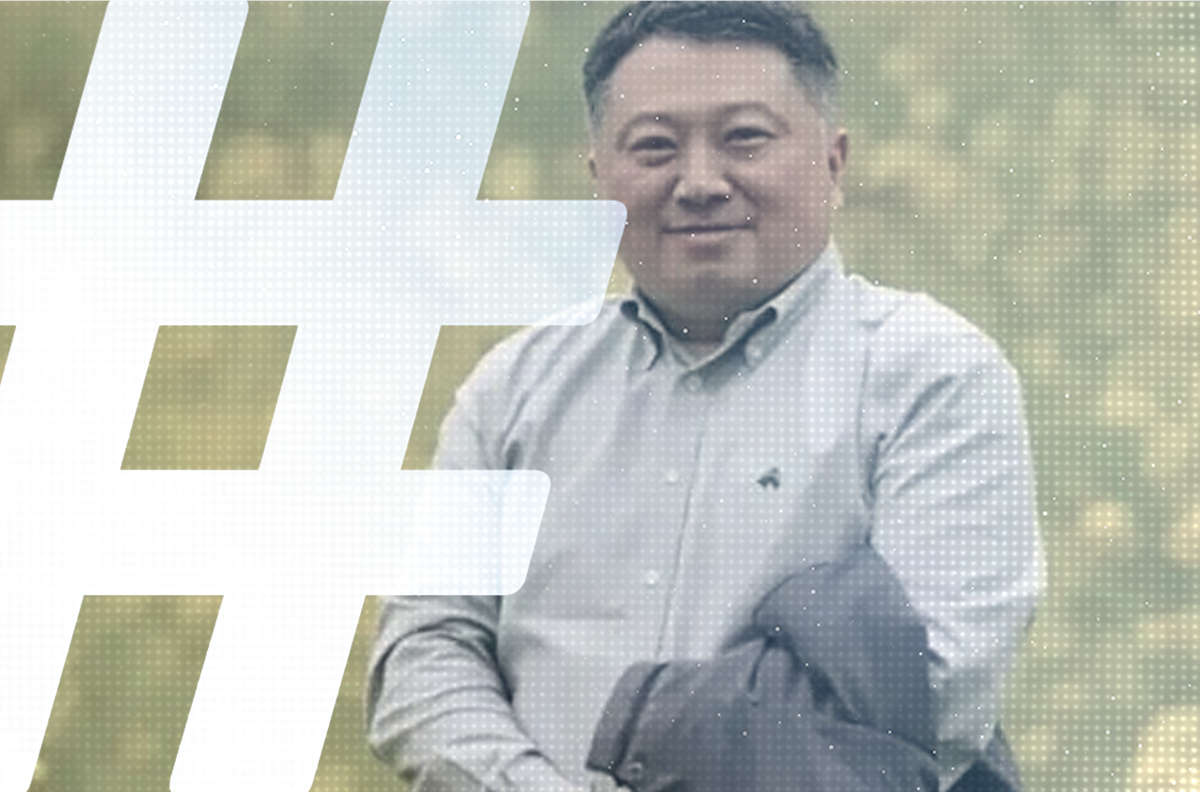
During a dialogue with African leaders and ministers on the sidelines of the BRICS summit in Johannesburg on Thursday last week, Xi Jinping pledged to support local industrialization in developing nations in Africa. As this news was reported in party-state media back home, the stress was on the Chinese leader’s language about China’s “developing nation” status. “China has always shared the fate of developing nations,” said Xi. “It has been, is now, and will forever be a member of the developing world!”
Forever is a very long time. And for critics internationally who contend that China is an economic giant receiving undue preferential treatment — including billions in World Bank loans — by virtue of its designation by the United Nations as a “developing nation,” forever will certainly raise questions.
What exactly does Xi Jinping mean?
The Foreverness Wave
Xi Jinping’s address during the Thursday dialogue was front-page news across China the next day. The CCP’s flagship People’s Daily newspaper highlighted the key points, including the language about China’s “developing nation” status, in bright red bullets on the right-hand side of the masthead. Treatments in all other central and provincial-level outlets were virtually identical, with even local Party news shoved to the background.

But as the wave of BRICS coverage was focused through the lens of online and digital outlets, separating the essentials from the verbiage about “win-win cooperation” and a “community of shared destiny,” a single line came through: “China will forever be a member of the developing nations.”
On the news app of The Paper (澎湃), a digital outlet launched in 2014 under the state-run Shanghai United Media Group, this line was the headline and the news brief: “At morning local time on August 24, President Xi Jinping said that China will forever breathe together with the developing nations, share their fate, and that [China] has been, is now, and will forever be a member of the developing world!”

This coverage was echoed in media outlets across the country. In Liaoning province’s official North Country (北国网) portal, run by the Liaoning Daily, on the official Douyin account of The Beijing News, and way down south in Yunnan’s Kaiping News (开屏新闻网). The same was true at Haiwai Online (海外网), a website affiliated with the overseas edition of the official People’s Daily, and on official portal sites in cities across the country, like Changsha.
Forever Since When?
In fact, Xi’s language about the foreverness of China’s developing nation status dates back to at least early April this year, shortly after the United States House of Representatives passed a bill that supported the removal of China’s “developing nation” label at international organizations.
On April 12, a piece in the People’s Daily written by Shi Qing (史青), a pseudonym likely for an official writing group at the newspaper reflecting the central leadership’s view, argued for China’s current status as a developing nation on the basis of various economic measures, before stating in no uncertain terms that the country will forever be “developing” in a political sense. “For China, developing country status has a special political nature,” the commentary said.
A few days after the People’s Daily commentary, Chinese blogger Lao Ding (老丁) broke the Shi Qing argument down further, pointing out its curious inconsistency with China’s clearly stated ambition to achieve strong and continued development.
“So does ‘forever a member of the family of developing nations’ mean that China intends to ‘lie flat’ and continue to be a developing country?” Lao Ding asked, referencing a recent popular online meme that rejects the call to strive forward, preferring instead a life of sufficiency and balance. “Well, if that’s the case, what is the reason in our current economic efforts? Doesn’t the political report to the 20th National Congress say that by 2035 one of the goals of our country’s development is to reach the level of a mid-range developed nation?”
Lao Ding was not wrong. Xi Jinping’s political report to the 20th National Congress of the CCP had said exactly that, in a section on the Party’s “Missions and Tasks.” By 2035, China was to become a “mid-range developed nation” (中等发达国家).
“I understand it when it comes to love,” wrote Lao Ding. “But what does forever mean?”
He found his answer in the People’s Daily passage about the “political nature” (政治属性) of the “developing nation” label, which included this bit of history:
In 1964, the first United Nations Conference on Trade and Development (UNCTAD I) identified the vast number of countries in Asia, Africa and Latin America that had achieved national liberation after the Second World War and had taken the path of autonomous development as ‘developing countries’ as opposed to developed countries.
The “political nature” of the developing nation, in other words, is about the history and ongoing identity of liberation. Like so much in the Xi era, this political identification is to a great extent a repackaging of longstanding CCP concepts. The notion that China is essential to liberation from colonialism, imperialism and hegemonism has been a centerpiece of China’s foreign policy ever since Mao Zedong sought to unite the “Third World” — now an offensive term, mind you — against the United States and the Soviet Union, and to rally the people of Africa, Asia and Latin America to form a new international order.
“I understand it when it comes to love. But what does forever mean?”
– Chinese blogger Lao Ding
Understanding this political definition, it becomes clear why Xi Jinping and the CCP are embracing the “developing nation” label so steadfastly. The label is essential to China’s vision of itself as the central protagonist in the creation of another “new international order” (国际新秩序) that according to Party-state media is more equitable and reasonable, what China and Russia outlined in a joint statement just 20 days before the latter invaded Ukraine.
So, you see, China likely is not now, or at least very soon will not be, a developing nation in an economic sense. Even so, China’s core international identity as a defender against imperialism and hegemonism means for the CCP that it will always have “developing” status politically — regardless of economic development or the improvement of its international status.
One might rightly protest that liberation forever means liberation never. That, however, would prioritize logic over political necessity. For the CCP, there is a distinct political advantage to a global crown of thorns that never slips, no matter how high they tower over their developing cousins.




















